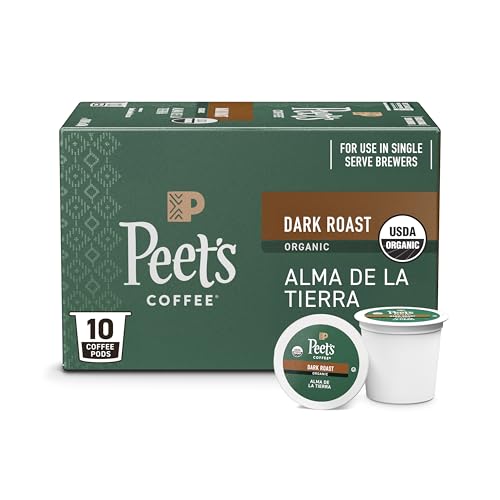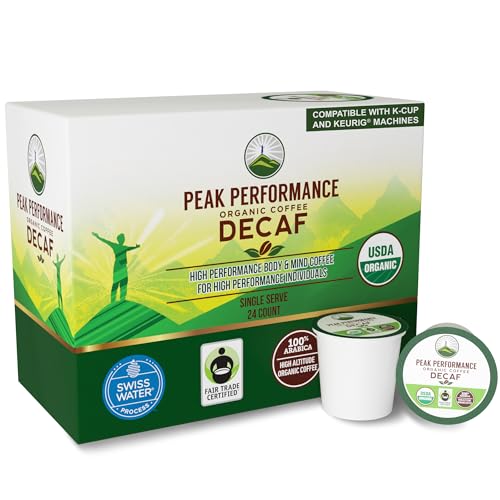Choosing the right organic coffee for your Keurig can be a challenge with so many options available. Organic certification ensures your coffee is grown without synthetic pesticides and fertilizers, which is better for both your health and the environment. But beyond that, the world of organic K-Cups offers a surprising range of flavors, roasts, and ethical commitments.
This guide is designed to help you navigate that world. We have compiled a selection of the best organic single-serve coffees, from intensely bold dark roasts to smooth medium blends and even a health-conscious decaf option. Whether you prioritize flavor intensity, eco-friendly packaging, or fair trade practices, there is a perfect pod waiting to revolutionize your morning routine.
Our Top Picks for Organic K-Cup Coffee
- Death Wish Coffee, Dark Roast Single-Serve Pods
- Newman’s Own Organics Special Blend K-Cup Pods
- Real Good Coffee Co. Organic Dark Roast Pods
- The Organic Coffee Co. Compostable Java Love Pods
- Green Mountain Sumatra Reserve K-Cup Pods
- Peet’s Coffee Organic Alma de la Tierra Pods
- Peak Performance USDA Organic Decaf Coffee Pods
- The Organic Coffee Co. Java Love Pods (36 Ct)
- Newman’s Own Organics Special Blend K-Cup Pods
Death Wish Coffee, Dark Roast Single-Serve Pods

For those who need a serious jolt to start their day, Death Wish Coffee offers an extra kick of caffeine. This dark roast is designed to transform your basic cup of coffee into a bold and intense beverage. It promises to supply an abundance of energy to help you perform at your peak throughout the day.
The flavor profile is surprisingly smooth for such a strong coffee, with subtle notes of cherry and chocolate and no bitter aftertaste. The brand uses a premium blend of Arabica and Robusta beans sourced from around the world to create a taste that is both powerful and enjoyable.
Newman’s Own Organics Special Blend K-Cup Pods

Newman’s Own Organics provides a hearty and full-bodied blend that combines medium and dark roasts. The result is a coffee that is bold yet refined, offering a strong but smooth flavor profile. It’s an excellent choice for those who appreciate a balanced and consistent daily brew.
This coffee carries both USDA Certified Organic and Fair Trade Certified seals. This means you are enjoying a quality product that supports environmental sustainability and fair practices for farmers. It’s a feel-good coffee that tastes good, too.
Real Good Coffee Company Organic Dark Roast Pods

Real Good Coffee Company delivers a full-bodied, single-origin dark roast that makes an invigorating classic cup of morning coffee. Sourced from Sumatra, these USDA Certified Organic beans are roasted in Seattle for a fresh, high-quality taste.
The tasting notes are unique and complex, bringing together flavors of bell pepper, cedar, and a lemony acidity. For the environmentally conscious, the company roasts and packages its coffee in 100% recyclable coffee pods, making it a responsible choice for your daily habit.
The Organic Coffee Co. Compostable Java Love Pods

The Organic Coffee Co.’s Java Love is a sweet, medium-light blend of Central American coffees. It features a delicious flavor profile with notes of milk chocolate, cinnamon, and carmelized spices, offering a comforting and aromatic cup.
A major benefit of this product is its commitment to sustainability. The OneCup pods are commercially compostable, certified by BPI. The entire pod, including the outer bag, is made from plant-based materials, significantly reducing plastic waste compared to traditional K-Cups.
Green Mountain Coffee Roasters Sumatra Reserve K-Cup Pods

Green Mountain Coffee Roasters brings the complex flavors of Indonesia to your cup with its Sumatra Reserve. This coffee has a deliciously dark body and a heady aroma of brown sugar and warm spices for a bold and sultry experience.
This medium roast is made with 100% Arabica coffee and is both USDA Organic and Kosher certified. The brand is committed to sustainably sourced coffee, ensuring a richer cup that also supports better farming practices.
Peet’s Coffee Organic Alma de la Tierra Pods

Peet’s Coffee is known for its deep-roasted flavors, and the Organic Alma de la Tierra is a prime example. This dark roast is smooth with distinct tasting notes of toasted nut and cacao, providing a sophisticated and satisfying cup.
The name, Spanish for “Soul of the Earth,” reflects the coffee’s origin in the high-altitude regions of Latin America. As a 100% Arabica coffee that is USDA Organic, it delivers a high-quality, flavorful brew that is compatible with all single-serve machines.
Peak Performance USDA Organic Decaf Coffee Pods

For those who love coffee in the evening or are sensitive to caffeine, Peak Performance offers a high-quality decaf option. This coffee is decaffeinated using the Swiss Water Process, which uses only water, avoiding the chemicals found in other decaffeination methods.
These pods are Fair Trade, USDA Certified Organic, and made from single-origin beans grown at high altitude. The high-altitude growth results in a denser bean with more antioxidants, making this a healthy and conscientious choice for your decaffeinated brew. The pods are also 100% recyclable.
The Organic Coffee Co. Java Love Pods (36 Ct)

This offering from The Organic Coffee Co. provides the same great Java Love blend in a smaller 36-count package. It is an exotic and syrupy blend of Indonesian and Latin American coffees, crafted from 100% organic, low-acid Arabica beans for a smooth taste.
The OneCup pods are designed for compatibility with most K-Cup style brewers, including Keurig 2.0 models. This makes brewing a single, easy cup of high-quality organic coffee a simple and convenient process every time.
Newman’s Own Organics Special Blend K-Cup Pods
Another listing for the reliable Newman’s Own Organics Special Blend is available for shoppers. This medium roast coffee continues to deliver its hearty, full-bodied flavor that is both strong and smooth.
As with the other listing, this product upholds its commitment to quality and ethics with its USDA Organic and Fair Trade certifications. It remains a solid choice for anyone looking for a dependable and socially responsible organic coffee.
Buying Guide: How to Choose the Best Organic K Cup Coffees
When I first started looking for organic K Cup coffees, I was a bit overwhelmed by the options. It’s more than just grabbing the first bag with an “organic” label. To find a coffee you will genuinely enjoy, there are a few key things I always consider. Getting this right makes my morning routine so much better.
The first thing I look at is the roast level. This is the biggest factor in determining the coffee’s flavor profile. Light roasts are brighter and often have more complex, fruity, or floral notes from the bean’s origin. They have more caffeine, too. Medium roasts are the all-around favorites, offering a nice balance of acidity, body, and flavor. Dark roasts are bold, robust, and often have smoky or chocolaty notes, with the roasting process itself defining the taste more than the bean. Think about what you usually like—if you enjoy a strong, classic cup, a dark roast is probably your best bet.
Next, I check the certifications. The term “organic” is regulated, so you want to see an official certification seal, usually from the USDA. This means the coffee was grown without synthetic pesticides or fertilizers, which is better for the environment and for you. I also look for Fair Trade or Rainforest Alliance certifications. These ensure that the farmers were paid fair wages and that sustainable farming practices were used. For me, a good cup of coffee feels even better when I know it supports both the planet and the people who grew it.
Another detail that makes a big difference is the packaging. Many K Cups are now made from recyclable materials, but it’s not always straightforward. Some require you to separate the plastic, foil, and coffee grounds before recycling, which can be a hassle. I personally seek out brands that use fully compostable pods. While you need access to industrial composting facilities for some, it’s a more environmentally friendly option that I appreciate. It’s a small step, but it adds up over time.
Finally, I think about the origin and blend. Single-origin coffees come from one specific region, which can give you a unique taste of that place’s terroir. Blends combine beans from different regions to create a specific, consistent flavor profile. There’s no right or wrong choice here; it’s all about your personal preference for variety versus a specific, repeatable taste. By paying attention to these factors—roast, certifications, packaging, and origin—you can confidently navigate the selection and find one of the best organic K Cup coffees for your own kitchen.
Frequently Asked Questions
What does “USDA Organic” mean for coffee?
When you see the USDA Organic seal on a bag of coffee or a box of K Cups, it means the coffee has been certified to meet strict government standards. The beans were grown on farms that did not use synthetic fertilizers, pesticides, or genetically modified organisms (GMOs) for at least three years. This process is better for the soil, the water, and the farmers working the land. For me, it’s a trusted signal that I’m choosing a product that aligns with a more natural and sustainable approach to agriculture.
Are organic K Cup coffees more expensive?
Generally, yes, they do tend to cost a bit more than conventional K Cups. The price reflects the more labor-intensive and regulated farming practices required for organic certification. Farmers often have to use more manual methods for weed and pest control. Additionally, the certification process itself has a cost. I view the extra expense as an investment in both my health and the well-being of the farming communities and environment. The price per cup is still usually less than a trip to a coffee shop.
Can you recycle organic K Cups?
This is a common question, and the answer is, it depends on the brand. Many traditional K Cups are made from a mix of plastic, aluminum, and organic material (the coffee grounds), which makes them difficult to recycle in most curbside programs. However, many companies now produce recyclable or compostable pods. Recyclable pods often require you to peel off the foil lid and separate the grounds from the plastic cup. Compostable pods are designed to break down in commercial composting facilities. I always check the box for specific disposal instructions to make sure I’m handling them correctly.
Do organic coffees taste different?
Not necessarily because they are organic. The taste of coffee is primarily influenced by the bean variety, the region where it’s grown (its terroir), and the roasting process. An organic coffee can taste just as rich, bold, or smooth as a non-organic one. Some people argue that because organic farming often focuses on soil health, the beans can develop more complex flavors. In my experience, the main difference isn’t in the flavor profile itself, but in the peace of mind that comes from knowing your coffee was produced without harsh chemicals.
Where is the best place to buy organic K Cup coffees?
You can find a good selection in the coffee aisles of major grocery stores, warehouse clubs like Costco, and retailers like Target. However, for the widest variety, I usually look online. Websites like Amazon, Thrive Market, and the roasters’ own direct-to-consumer sites often have a much broader range of the best organic K Cup coffees, including from smaller, artisanal brands. Shopping online also makes it easy to read reviews and compare prices to find a good deal on a product you will be happy with.
